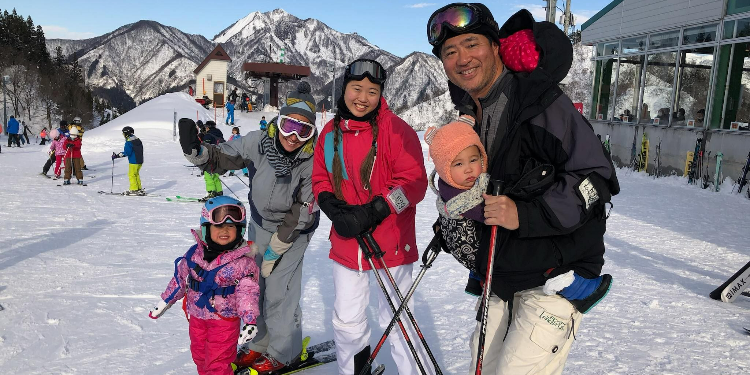
Eugénie was born to a French mom but grew up in Quebec. She has lived in many countries, including Australia and Paraguay, before relocating to the Philippines, where she met her Japanese husband. Finally, they decided to settle in Japan for a new start amid the Covid pandemic. She talks to us about her life experiences and career.
Tell us about your childhood, in Canada, with your French mom.
I grew up in Quebec and followed the Quebec school system. My friends were and are all “native Quebecers”. I liked sleeping over at my friends' places to immerse in the Quebec universe. This helped me grasp the local expressions and the culture. My mom is of French origin and has lived in Quebec for 38 years. Her friends are also my family as my brother and I grew up next to them. Their children are like our cousins! But our little family bubble has preserved the French culture. At home, my mother used to cook French dishes and raised us “à la française”. Sometimes, at school, I used to say French expressions that sounded funny to everyone.
You have had the opportunity to live in many countries. What brought you there?
In Quebec, I studied teaching in school and social adaptation at university because, since the age of 10, I have wanted to be a "remedial teacher". After my 4 years of full-time study, I thought of pursuing a master's degree, but I ended up opting for a professional adventure that helped me discover education elsewhere in the world. I moved to France for work, and gained a lot of professional experiences. This took me to Australia, Paraguay, the Philippines, and I am currently in Japan. Since I am of French origin, I wanted to promote remedial education. This is a practice born in Quebec, well-established since the 1960s in the French school system.
From your experience, what is the best part about living abroad?
Living abroad, in a country where we haven't yet taken our bearings, allows us to be more ourselves. I don't know if it's a unanimous feeling, but I do feel this way. I feel like I can be myself since I'm "different" anyway, in terms of culture, appearance, language, and everything else. I like our everyday life abroad because it is always full of challenges and discoveries. I like the climate of the countries where I have lived, and I like to share this lifestyle with the people around me. However, coping the socio-economic difference and the difference in the level of education can be difficult at certain times, depending on where you go. Respect and open-mindedness are the keys to accessing everyone's potential without being judgmental.
You then met someone who changed your life. Can you tell us about it?
Mikio and I are huge Latin dance fans. Mikio was in the Philippines long before me. We met at a dance party. I had been in the Philippines for 6 months, and I was discovering the "salsa/bachata" circle in Manila, where Mikio was already well integrated. We danced a lot together and became really good friends to rely on for a year. Then our bond strengthened, and through our common interests and our many long and endless discussions, we finally overcame the barriers like the age gap, cultures, and language. Mikio is Japanese and speaks very good English (but not French). At that time, he was 45 and I was 26. It was hard to believe that this type of relationship could take shape, especially as he had a pre-teen daughter! But it still feels like yesterday, although we have been together for 6 years and have two little girls.
How long have you lived in Japan? Was it hard for you and your children to move there?
We arrived in Japan on January 3, 2021, as the government in the Philippines was asking all young people under the age of 18 to stay at home permanently. So we decided to leave the country to find a better life balance. Everything went smoothly. We arrived with only suitcases and stayed temporarily in a furnished apartment. I obtained a residence permit for one year, and, as all schools and daycare centers remained closed, and we work online, we decided to ship our furniture. We're thankful to be in the era of the rise of videoconferencing as we did everything online! The girls enjoy the Montessori school in Japanese. Mikio's first daughter stayed with us for the first year and was able to reinforce her mother tongue. She recently returned to the Philippines with her mother as the school has implemented hybrid learning.
What does your everyday life in Japan look like? What do you like the most and the least about your new country?
As a mum of young children (1.5 and 3 years old) and having lived in different poor and corrupt countries, what I like the most about Japan is security. People here are polite and respectful. There are public parks everywhere so children can develop and have a fulfilling childhood. Everything works fine -- the trains are on time, so we can travel everywhere, whether we want to go to the beach or ski, for example. Nevertheless, it can be quite difficult to build a social circle as we both work a lot and live in a fairly local area. It is difficult to go out to dance. We would have to go to Tokyo, the closest city, but we have no family or close friends to babysit the girls. Mikio's parents are older, and we only see them during the day; they don't keep the girls. In short, we like our life here, although we remain in a fairly tight family cocoon. Our meetings happen to be in connection with the parents of children of the age of ours, and we appreciate the moments spent in their company. The children play together, and it's always nice to be in a multilingual environment (French, Japanese and English).
You have also built your career in Japan in remedial education. Can you tell us more about it?
Remedial education is a profession that has existed since the 1960s in Quebec. In concrete terms, the remedial teacher intervenes upstream of school difficulties (prevention and screening) and downstream when the difficulties are significant or when the students have learning disabilities (re-education in reading, writing and mathematics, use of strategies, and compensatory tools). The remedial teacher evaluates the progress of the students continuously (the achievements and the needs that resist the interventions) to assess the achievements and issue recommendations. Collaboration and communication with teachers, parents and other stakeholders (speech therapists, neuropsychologists, etc.) are essential.
Since 2019, with my first maternity leave coming up, I wanted to avoid the feeling of professional isolation, so I combined the professional and personal sides to launch AIDEOR. Through this initiative, I'm able to contribute to the progress of the students while managing my time to take care of my baby. At that time, online remedial education did not exist, but the parents who knew me were very happy with this initiative. But the boom in the world of videoconferencing during the pandemic helped demystify this new practice. Little by little, the requests increased and crossed the borders. My long-time friend, Geneviève Trempe, offered to do all the graphic design for the website. We are now a team of 5 remedial teachers and 4 people in the administration. I am very lucky to have so much support to help expat children.
Do you have any advice for families who would like to settle in Asia and Japan in particular?
Asia is very big and diverse. Moving to Southeast Asia and moving to Japan are really different things. However, my general advice would be to register at the country's embassy to stay updated about all upcoming events, in associations, and join Facebook/Whatsapp groups. Sometimes, meeting a family opens the doors to another, and this helps in creating bonds in the long run. Keep your interests as much as possible and seek new options, whether you prefer choir, dancing, swimming, hiking, etc. Moving abroad is not just a trip; it's more about combining your personal and professional life over a more or less long term. If you want to be happy, you have to keep "living" instead of just working or just waiting for the experience to end. Live and enjoy the present in this new place. The beauty is there, and you can discover it every day. Keep your eyes and heart open.



















